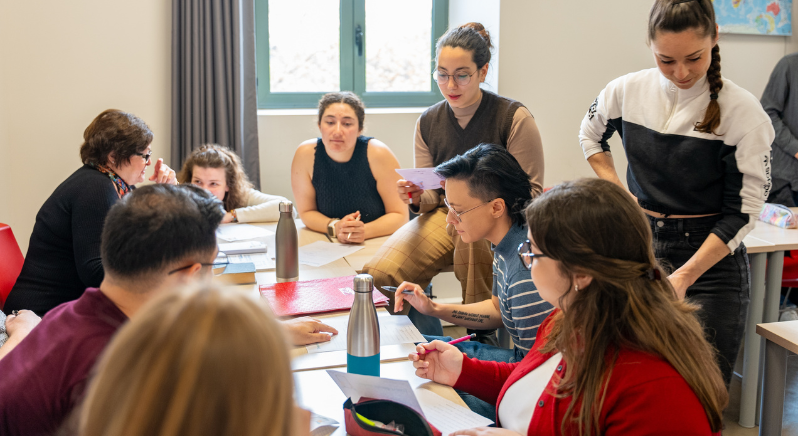Embarking on a journey to study abroad in France is an exciting and enriching experience. Learning how to create a budget for studying in France and how to stick to it is essential for making the most of this opportunity. This guide provides practical advice on creating and sticking to a budget, ensuring you can enjoy your time without financial stress.
Understanding Your Expenses
If you are here, you’re probably wondering how to create a budget for studying in France. Creating a budget starts with understanding your expenses. Key categories to consider include tuition fees, accommodation, food and groceries, transportation, and miscellaneous expenses like books, entertainment, and personal items.
Read about the monthly expenses you can expect as a student in France here: https://gogofrance.com/en/blog/monthly-expenses-breakdown-students-france/

How to Create a Budget for Studying in France
Creating a budget involves mapping out your income against your expenses. First, list your income sources, including scholarships, part-time job earnings, support from family, and savings. Knowing your total income is the foundation of your budget. Next, categorize your expenses such as tuition fees, rent, utilities, food, transportation, books, entertainment, and miscellaneous costs. Allocate a monthly amount to each category to visualize where your money is going. Overall, ensure your essential expenses like rent, food, and tuition are covered before allocating money to non-essential items like entertainment or dining out.
One of the best ways to proceed with the above is to create a budget spreadsheet. It is really easy and here’s how you can set one up for yourself:
- Step 1: Set up your spreadsheet and label the first row with the following column headers: date, description, category, amount, income, expense, and balance.
- Step 2: List all your income sources such as scholarships, part-time job earnings, support from family, and savings.
- Step 3: Categorize your expenses such as: tuition fees, rent, utilities, groceries, transportation, books and supplies, entertainment, miscellaneous, etc.
- Step 4: For each expense category, allocate a specific monthly amount based on your estimated costs.
- Step 5: Each time you spend money, enter the date, description, category, and amount spent in the respective columns.
- Step 6: In the Balance column, calculate the remaining amount by subtracting your expenses from your income. Use a formula to automatically update the balance.
Here is an example of how to create a budget for studying in France using a simple spreadsheet:
| Date | Description | Category | Amount | Income | Expense | Balance |
| Jul 1 | Scholarship | Income | 500 | 500 | 500 | |
| Jul 1 | Part-time Job | Income | 700 | 700 | 1200 | |
| Jul 2 | Rent | Accomm. | 400 | 400 | 800 | |
| Jul 2 | Utility Bill | Utilities | 40 | 40 | 760 | |
| July 5 | Groceries | Groceries | 100 | 100 | 660 | |
| Jul 15 | Transp. Pass | Transp. | 50 | 50 | 610 | |
| Jul 20 | Netflix | Entertainment | 10 | 10 | 600 |
Tools to Help You Budget
Several tools can help you manage your budget effectively:
- Budgeting Apps: Apps like Mint and YNAB (You Need A Budget) can track your spending and help you stay within your budget.
- Spreadsheets: Use Google Sheets or Excel to create a custom budget tracker.
- Bank Alerts: Set up alerts with your bank to notify you when your balance is low or when large transactions occur.
One more tool at your disposal to help you get an estimate is our cost-of-living calculator. Use our cost-of-living calculator to estimate how much money you will need during your stay in France. Get an estimate here: https://gogofrance.com/en/cost-of-living-in-france-calculator/. Keep in mind that your actual cost of living will vary depending on your location in France, the school you attend, the duration of your studies, your accommodation, lifestyle, and spending habits.

Tips for Sticking to Your Budget
Sticking to a budget can be challenging but is crucial for financial stability. Here are some tips:
- Track Your Spending: Regularly review your expenses to ensure you are staying within your budget.
- Cut Unnecessary Costs: Identify areas where you can cut back, such as dining out less frequently or choosing free entertainment options.
- Plan for Emergencies: Set aside a small amount each month for unexpected expenses.
- Stay Disciplined: Avoid impulsive purchases and stick to your budget plan.
- Use Monthly Envelopes: This technique is not for everyone but has proven its efficiency. It involves allocating a specific amount of cash for each spending category (such as groceries, transportation, and entertainment) and placing the cash in separate envelopes. Once the money in an envelope is gone, you cannot spend any more in that category until the next month. This method helps you control your spending and stay within your budget.
Affordable Living Tips in France
Living in France doesn’t have to break the bank. Here are some tips to make your stay more affordable:
- Take advantage of student discounts available for transportation, museums, and entertainment.
- Shop at local markets for fresh and affordable produce.
- Prepare your meals at home to save money and eat healthier.
- Use student travel cards and book tickets in advance for cheaper rates.
Read more about our living and saving tips that will help you cut down expenses: https://gogofrance.com/en/blog/saving-tips-for-international-students/

The Importance of Budgeting
Learning how to create a budget for studying in France and how to stick to it is essential for any international student planning to live and study in France. By understanding your expenses, crafting a realistic budget, and using available tools and resources, you can manage your finances effectively. Remember to track your spending, cut unnecessary costs, and take advantage of student discounts. With careful planning and discipline, you can enjoy your time in France without financial stress.











